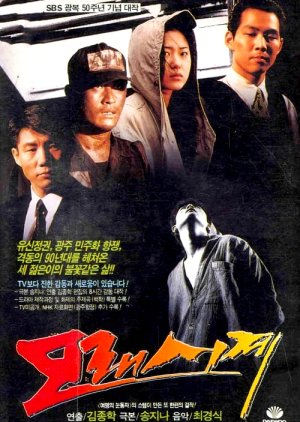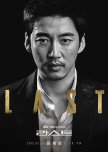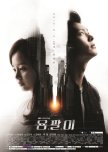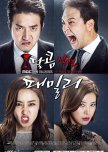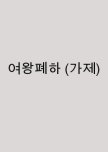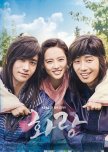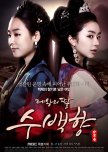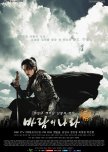
This review may contain spoilers
Haunting. Powerful. Taciturn. Unforgettable.
"Sandglass" is a KDrama that relentlessly, sophisticatedly and yet sensitively processes the pain of the South Korean people, that paves the path towards actual democracy. Here you can get a glimpse of a cultural phenomenon: 'Han', a collectively shared sense of painfully experienced injustice (see side note below). "Sandglass" is one of the first KDramas daring to use the medium of television for more than just entertainment. It is also one of the first who could even dare to do so. Here, recent contemporary history is critically targeted from all sides. And at the same time, it becomes a collective vigil for freedom of speech and opinion, for freedom of travel and for the rule of law that have only recently been painfully achieved."Sandglass" tells the story of three young people who were friends during the 1970s and 1980s - Park Tae-soo (Choi Min-soo), who actually would have liked to study but made a career as a thug in gangster milieu, Kang Woo-suk (Park Sang-won ), who hopes for the power of the law and thus studies law, and Yoon Hye-rin (Go Hyun-jung), sort of imprisoned within the golden, solid cage being the daughter of the most influential, officially tolerated casino king in the country, who systematically suplies the government with his money from gambling via anonymous bank accounts. Jumping back and forth in time, the fatal emotional bond between the three is unraveled against the background of social events. It is a dramaturgically conscientious reckoning with the military dictatorship, its abuse of power and its crimes against the people. Original film documents were seamlessly played in, i.e. during the staging of the Gwangju massacre. The presentation of the Samchung re-education camp was also staged as realistically as possible on the basis of original photos and documents. The second half of the story then goes through the destinies of the three protagonists in mafioso style: the gangster, the prosecutor, and the heiress to the casino king. The finale is on the one hand the moment of free election for the people (running in the background), and on the other hand the result of the personal (more or less free) choices of the three protagonists, who still share a world in which despite all recent tumult and uprising basically not much has changed...
More than half of the South Korean population watched the 1995 KDrama "Sandglass". It was praised and praised again. Hard to believe, that it is these days hardly available for streaming with subtitles, never mind as DVD. Apparently, those who have a DVD are reluctant to give it away. I can understand, after I actually saw the KDrama myself - first only in the original version without subtitles (wasn't that bad, because mostly there isn't much talk :-) ), then with a time delay also with subtitles (it was definitely helpful :-) ), and by now also knowing a little more about that historic background. "Sandglass" is truly a masterpiece. Yes, it is taciturn, thrives on the acting, on long shots and on purposefully used, deliberately reduced light. It doesn't sugarcoat anything. It wants to let it sink, each and every moment. The camera accompanies the events almost like a documentary. Without comment, sequences, events, moments in time stand side by side. The story unfolds like a suction and draws you in. The soundtrack supports this pull effect. The story takes its course, the course of which is known, i.e. is predictable: Park dictatorship / suppression of democratic aspirations under the pretext of North Korean infiltration / Chun Doo-hwan supreme military leader, commander of the security and finally new president by coup d´état / martial law, Gwangju Uprising and massacre / cleansing camps / June 1987 fight, abolition of censorship, end of military dictatorship / free elections in 1992. Amazing and grandiose that via TV series a critical review of those bloody 1980s was already possible in 1995. It's brilliant, too, how the protagonists with their very different backgrounds, values and goals are fatally interwoven and mercilessly swallowed up by historical events and social circumstances.
A fantastic K-Drama. Completely consistent. first class.
A sad story. Not funny. Not at all. You have to be able to get involved with the dramaturgically idiosyncratic, taciturn handwriting. (The mood should be right, so to speak.)
(And yes, it's an old ham when it comes to production quality. Screen format, picture and sound quality can hardly keep up with the Netflix era - a digital remastering would definitely be desirable...)
Anyone who is interested in the topic but can't get to the KDrama can grab an impression of the Gwangju massacre in "Youth of May" (2021), or a feeling for the time under military dictatorship and for the concentration camps in "Giant" (2010).
However, if you have the opportunity to see "Sandglass", I recommend that you go for it. Even without historical or socio-cultural interest, KDrama has a lot to offer in terms of impressiveness and melodrama.
------------------ HISTORICAL BACKGROUND INFORMATION -----------------------
Admittedly, being able to classify the historic events, helped for me. E.g. at the beginning there are scenes in which thugs and police bus-wise arrive at a building and disperse the opponent party´s event. This was actually the key historical point, marking the beginning of the massive social unrest, which resulted in actual free elections 13 years later. In fact, it was originally a comparatively small strike in 1979, which took place on the 4th floor of the New Democratic Party's headquarters. Around 200 women, workers at the textile company YH Trading Corporation, protested against the closure of their factory. Unions had no place during Yushin dictatorship, however his sit-in-demonstration was actually almost too minor, to interfere. Nevertheless, the government used the particular context at the opposition party building as a cover for a major anti-opposition operation - 'Operation 101'. Around 1,000 police officers in uniform and civilian gangs of thugs assaulted leading party members and 174 of the demonstrating women workers. Union leader Kim Gyeong-sook died while jumping out of the window.
The civilian thugs (fictional Tae-soo in "Sandglass" being one of them), were subordinate to the main money-provider of the regime (here the casino king and Hye-rin's father, who clean-washed his income for political means.)
That factory workers´ trade union action by no means was the reason for the following uprising. However the occasion served as the momentum for what was to come. Against this background, the later (fictive) encounter between Hye-rin and one of those women from 1979 becomes understandable. Hye-rin adores the by now torture-broken woman for her brave fight for democracy back then. That woman, however, never wanted a political revolt, she just didn't want to lose her job. In fact she feels betrayed and instrumentalized in a political fight that she really didn't want to fight and in which she lost everything, even herself, her dignity and self-respect.
Responsible for the politicization of events that had taken on a dynamic of its own, was actually the Park regime itself: it´s attempt to split and suppress the opposition. By demanding the party leader Kim Young-sam and his deputies to resign from their mandate provoked and politicized the public. Since this coincided with the beginning of the winter semester, the student movement, too, took the incidence for a red-hot political profile: demanding the end of the Park government. A corresponding demonstration in Busan was violently suppressed in this context. A few days later, president Park was assassinated by the head of the Korean Central Intelligence Agency (KCIA). This assassination had nothing to do with the students and their demands. Neither does North Korean Communism. It just coincided timewise with the Busan demonstration. The military, in turn, took advantage of the political power vacuum situation, imposed martial law on the mainland, installed a far-reaching investigative body and thus paved the way for the meteoric rise of Chun Doo-hwan, who was appointed chief investigator. He used his chance consistently and purposefully. After 8 months of military coup, the country had a new dictator in uniform who presented himself as the savior of the nation.
He repreatedly and systematically declared the pro-democracy drive the enemy by spreading conspiracy and infiltration theories about North Korea's ambitions. Press and public were massively manipulated with so-called K-operations (king´s operations) in order to convince the people by the good of military rule. The credo was: the military and Chun Doo-hwan were the only chance to counter the spreading, communist-manipulated unrest, in creating something like order and security. At the same time, the military units were drilled with the so-called Choongjung (True Heart) training for a particularly aggressive and efficient suppression of demonstrations. New paratrooper units were created as special forces. In addition to physical fitness, the training included the development of a strong corps-spirit and the use of massive violence and targeted abuse.
Against this background, the situation among the military units deployed in Gwangju in May 1980 can also become somewhat more understandable. On the one hand, they were brainwashed. On the other hand, to date it has still not really been clarified who gave the orders for the escalating violence in May 1980 - e.g. orders to shoot and the use of paratroopers. Internal ambivalence and irritation was common at all levels of command. But that didn't help. In the end the corps-spirit was more binding and prevailed. In this respect, the executing soldiers, as perpetrators, somehow became victims in those sad May days, too. The proclaimed enemy - North Korean Communism, which is behind the pro-democracy movement - and the unshakable pillar of power - the military dictatorship with all its arrogance - posed such a strong, effective, powerful threat, so that it was so frightening people in uniform (and without) and made them hitting their brothers and sisters indiscriminately (again, after barely three decades). Because someone had chosen Gwangju as the place of the example. And because the sides there had just turned out that way - those who lived in, studied in or visited Gwangju on the one hand, and those who were doing their military service at nearby barracks at the time. On the other hand, the political vision or just a simple wish, that everybody might finally live freely under fair conditions, seemed hopeless. Suddenly the fight was (rather apolitical) about pure survival and desperate rebellion against arbitrary violence.
Eventually, with "Sandglass" the South Korean population became seriously aware of what had really happened in Gwangju in 1980: a people´s uprising against military oppression, being brutally suppressed. Because of the propagandistic K-operations and the censorship (which was repealed only in 1987), knowledge of these events was never really able to spread. Numerous witnesses had deliberately been put into camps or imprisoned. For the television audience in 1995, these street-fighting scenes must have come as a complete shock, not only because they are terrifying in themselves (regardless of where and when), but because they actually had taken place in such brutal manner and in such close proximity completely without their knowledge. In this way, "Sandglass" also became the trigger for nationwide latest history processing. The TV production paved the way for more critical historical scrutiny in the media and also apparently accelerated the course of the trial and sentencing of ex-President Chun Doo-hwan in 1996. He was sentenced to death. (However, on appeal it was turned into a life sentence. His assets, of course, were safely parked, too. He died of cancer in 2021.)
---------------- Side note: --- NATIONAL SECURITY ACT ----
The National Security Law has been in force in South Korea since 1948 - until today. Its primary purpose was to push through anti-communist propaganda and to control or shut down opposing intellectuals, artists, journalists, students etc.. This National Security Act de facto restricts freedom up to this day and ultimately violates the 1948 Universal Declaration of Human Rights and the 1976 International Covenant on Civil and Political Rights, which South Korea had actually ratified. Fatally, it seamlessly continues a relic from the days unter Japanese rule. Several 100,000 people have fallen victim to this law over the past few decades. The verdicts resulted in prison sentences of thirty to forty years, which is among the longest in the world. It has served military dictatorships well, opening the door to arrest and torture countless times. Even after the end of the dictatorship, as late as 1989, obviously an average of 3.3 people each day were arrested, tortured and sentenced to prison under this national security law. To this day, the law is still officially considered constitutional...
--------------- Side note: --- RE-EDUCATION, CLEANSING AND CONCENTRATION CAMPS ---
A unique dubious institution during the Chun Doo-hwan dictatorship were the concentration camps for re-educating unwanted citizens. 25 such camps were set up in the aftermath of the Gwangju massacres. They served to systematically clear the streets of South Korea of unwanted people (and yet mostly arbitrarily as a military demonstration of power). The camps were primarily used for brutal abuse - any dignity was broken, body and soul pushed to the limit.
The detainees were divided into 4 categories: A implied prison; B and C an agonizing time in one of the re-education camps; D a warning. Category B and C inmates often ended up in prison as well, provided they survived the re-education camps. E.g. a former military prison in Yeoncheon, Gyeonggi was thus modified according to 'Samchung Plan No. 5'. This location officially was established to fight North Korean Communism: up to 100,000 innocent people may have gone through hell without a warrant - and rarely enough survived.
--------------- Side note: --- HAN ---
Han can be considered a collectively shared, identity-forming cultural pain in the sense of sad and angry grief. This cultural characteristic developed in the course of Japanese colonization of Joseon. There has been, and still is, debate about the extent to which Han can or cannot be considered a collective trait that creates identity. In any case, as a shared painful experience of that time, a specific form of expression of grief developed, while behind melancholy suppressed anger also resonates. Han has found its very unique solemn, deeply and sadly swinging aesthetic in Korean culture, which we can observe/feel in music, film, television, literature, poetry etc. It can be considered a collectively shared state of mind, that feeds on the traumatic experience of humiliation and abuse as a people that Joseon endured so massively at the hands of the Japanese oppressors. Han addresses helplessness in the face of overwhelming injustice. But despite all the pain and sadness, there is also something tough in Han: an inner resilience, a rebellion, that still provides something like strength in the darkest depths.
Han was further nurtured in the post-Joseon era by the separation of families into two antagonized nations. Finally those brutal 1980s, which are revived in "Sandglass" in the sense of a solidary vigil, tie directly to this collective Han - as a basic feeling that continuously and silently runs through (especially) the first half of the KDrama. A collective emotional state from which one cannot escape: the experience of suffering; the ability of suffering; the national destiny of suffering.
In the course of South Korean turbo-capitalism over the past two decades, Han as an issue has receded somewhat into the background among the younger generation. Nevertheless, there is already a new, modified, less beautiful form of expression: ´Hwabyeong´, the culture-specific Korean manifestation of a depressive psychosomatic disorder with characteristic symptoms, that already affects wide circles - as a result of suppressed anger in the face of overwhelming social circumstances experienced as unfair. (e.g. victims of any sort of bullying in school or at work etc.)
(I wonder, whether it would not be better to continue to give Han an explicit, contemporary, aesthetic expression - in contrast to the embellished, perfected facades e.g. in KPop + KDrama culture... but that would be another topic.. .)
Was this review helpful to you?

This drama surprised me in so many ways. Despite its age, it's very watchable today. The acting was stellar all around. It felt quite natural and in a way, less staged and choreographed than many modern dramas. Seeing actors such as Choi Min Soo and Go Hyun Jung in their breakout roles would make the 24 hours of heartache worth it even if the drama was not quite as good. It is that good, though!
The music, while unconventional, fit the mood of the drama well. Thank goodness they chose atmosphere over trendy ballads because I'm sure I would not have appreciated that as much in 2018. It got a tiny bit repetitive, but it's a minor issue. I wonder if that was a criticism they got when the show aired as well? At some point pretty late in the drama, a "new" background music appeared to soundtrack all the action scenes. (I didn't like it. It was cheesy and didn't fit with the rest of the music :P)
There are only a few other things I can think of to criticize. The wardrobe seemed odd to me. The story runs from the early 70's to the late 80's. It was filmed in the mid 90's. Throughout the drama, the clothing was basically pure 90's to my eyes. So when the real life footage shows up, it's kind of jarring that those people are actually wearing clothes of their time but the drama characters are not. It's a bit jarring. And the other criticism is that the sound effects are very dated. Cartoonish "thwaps" and "pows" abound whenever a fist fight occurs. It's kind of endearing in a way, though. :)
I won't describe the story. Even if you aren't normally a fan of politics and gangsters, you might find you like them in this context. If I had known in more detail what I was getting into, I might not have been so eager to watch, so don't let genre deter you if gangsters aren't your thing either. I was won over by the pace of the story and the compelling characters. I was impressed by the lack of common tropes. If I had any preconceived notions of what a 90's kdrama was like, I think it must have been that I expected way more cliches and the same old tired tropes that we still have even now. They had to come from somewhere, right? Well, maybe, but they didn't come from this drama. No childhood chance meetings ending in eternal love. No clear-cut, neat revenge plots. What it does have: lots of gray characters, which are my favorite kind. A surprisingly strong and articulate female lead. No easy answers, no preachiness, but lots to think about.
The intertwined lives and fates of the three main characters is what drives the story. What holds it together and gives it staying power, even today, are the timeless themes of corruption, abuse of power, and the thirst for change for the better despite so much resistance and sheer inertia. (And bringing in real life issues and events that would still have been in the fairly recent past for the audience at the time lends it that much more weight.)
Lastly, THE ENDING. I shall say no more in terms of story. But it hit me like a ton of bricks. Nicely done, show.
I cannot believe that no one has written a review for this drama! I'm not sure my review does it justice, but if you like a compelling drama and don't mind some dated effects and styles, then give it a shot.
Was this review helpful to you?

Korean Politics through Turbulent Times
I hope more drama lovers would stumble upon this old classic K-Drama. Everyone can see why Sandglass is a highly respected formative K-drama that sets the bar high for other dramas to follow once watched. Today's modern Romantic-comedies, melodramas, and Flower Boy Shows have omitted a lot of Korea's important history that shaped the nation they are today that Sandglass can fill you in on.It was the second collaboration of director, Kim Jong Hak, and screenwriter, Song Ji Na working together. The first instance occurred on the project of Eyes of Dawn (1991) that dealt with the turbulent times of the Japanese Colonial period to the Korean War. The director interfuses real events filmed during these turbulent times spanning two decades into the filming of Sandglass to give the show added authenticity. The show received high ratings during its run averaging 50.8%.
I would recommend viewers watch it at their discretion considering the violence and rollercoaster of emotions throughout the drama. The actors put the script in action, expertly depicting the journey of pain, sorrow, and redemption they take. Their paths are different from what they ever imagine. You can say it is a little overacted, but the characters are like real people with real-life troubles coming alive on the screen. I especially enjoyed the music, but some people might find it cheesy. The costume sets were a bit average than I expected, but I do not care for 100% authenticity. They depicted the periods correctly, so it did not detour from the viewing experience. Last note, watch this gem if you are into politics, and you want to learn little bit about Korea's history.
My Final Rating: 8.49964.
It is a rewatchable show, but I have seen this three times, so it takes me years before I can watch a gem like this again, so do not be fooled by 6.5.
Was this review helpful to you?

This review may contain spoilers
Grim, downbeat, but compelling old classic
This is the oldest Kdrama I've ever watched, but it's surprisingly well-made, and the subject matter, violence, and gritty realism are actually more mature than most recent Kdramas I've seen. I can understand why it was such a sensation back in the day, because it's always watchable and engrossing.However, it's relentlessly violent and depressing, with lots of scenes of massacres and atrocities, torture, beatings, and cynical corruption. It's really eye-opening to see how brutal and corrupt the Korean government, military, and law enforcement were just a couple of decades ago. A country that today is known for its high standard of living and quality entertainment and products that are popular around the world used to be a repressive banana republic that put a low priority on human rights. These are important topics, but just be prepared for some depressing material.
Also, I have a major problem with the character of Hye-rin. Basically, she's responsible for the death of the 2 men who loved her most. Of course, she sheds some tears, but I feel like she still doesn't realize at the end just how much she's responsible for these needless deaths. And I still don't understand why she made the idiotic decision to walk right into Jang-do and Do-shik's trap, dragging Jae-hee and Tae-soo down with her. Was she intentionally trying to basically go on a suicide mission by insisting on going alone, and if so, why the hell would she do that? But no, she seemed really surprised when all those men attacked her, so I guess she was just naive and idiotic. And that's just the worst of her many bad decisions and stupid misunderstandings.
Also, the Jae-hee character is so pathetic. He's just a chump for Hye-rin, and he has no personality or life of his own aside from his devotion to her. How sad. At least he made up for it many years later by winning the squid game.
It's ironic that, out of the 3 main characters, Woo-suk is the one who's guilty of the worst crimes. Tae-soo might have been a thuggish gangster, but he only murdered someone who deserved it, and he could have made a good argument that it was self-defense. But Woo-suk participated in the slaughter of totally innocent people, a true atrocity. Of course, he was just a lowly soldier following orders, and he would have probably been shot for insubordination if he had tried to resist, but you can say the same thing about lots of soldiers throughout history who participated in horrible war crimes. But the person who received the death penalty was the noble gangster, Tae-soo.
So this drama riled me up in many ways, but I was never bored. I'm really glad that I finally had the privilege of watching this important and historic Kdrama.
Was this review helpful to you?

This review may contain spoilers
Don’t usually have the patience to watch lengthy K-dramas but Sandglass was just splendid tv. It was quite sad towards the end though as one of the main characters goes down a dark path only to get no real happy ending but it's a logical one so I can't complain. The use of violence was way graphic though. There was more than I was prepared for. I loved how they used real life footage of the Gwangju Uprising and the suppression that followed. It’s one of the most famous parts of the show so I expected it to be at the end, the climax, but it comes out of nowhere. I’m currently reading books on how the time links in with Korean cinema & knowing the background of it all makes it very daunting to watch. The stuff with the Samchung Camps was frightening to watch too. That was fucked up shit. It was an interesting commentary on society of the time though. Would recommend if you're not seen it already. The story was a masterpiece and the acting and writing was a perfect accessory to it all. While it's not a 10/10 because some of the Gangster Plot lines span its wheels a bit and felt a bit boring at times, this was a show that hooked you into each of the 4 main characters, regardless of their actions and motivations, which weren't exactly the most audience friendly. Park Tae Soo is a ruthless thug with no real morals, Hye Rin gets more cold and detached as the plot progresses, Jae Hee is silent for most of the show. The only good person, above all else, was Woo Suk. And yet, the deaths and trials of the characters had us, the audience, living and breathing as they were. Park Tae Soo goes through some of the worst pain a person can go through. Thrusted into a situation he had no intention on being apart of, forced into humiliation and some of the most abhorrent forms of torture only because he loved Hye Rin, manipulated by said person later on and sentenced to die at the end of it all. All that pain and suffering with no light at the end. Apt character direction for a show like Sandglass.
Was this review helpful to you?

This review may contain spoilers
Great Start, Boring Middle, Decent-ish ending
Sandglass had a great start, a boring middle, and a decent-ish end. There is a political theme throughout, which I think was more interesting when this was inter-mixed with action and slight romance, but when this wasn't present, was quite boring to follow. Another thing that I wanted to say: Sandglass has EASILY my most least-liked FL (so far at least, although I think this will be very hard to beat). The FL's character is absolutely awful. The actual actress is good, so nothing against her. But the character she played... will, no matter what, be one of my least favourite characters in general forever (I think, anyways!).Apart from this, I really found the bromance between two of the ML's an absolute pleasure to watch. I also found the politics (when done right) really interesting and gripping. The action scenes were absolutely amazing too, whoever co-ordinated some of those scenes especially must have received some applause after this came out back in 1995. And I really did enjoy the characters in this (except the FL) and all the different relationships and dynamics each had with one another. The OST was legendary, just too overplayed throughout.
All in all, however, I do recommend this. Sandglass is a definite watch. But the first portion is definitely the best.
Was this review helpful to you?

Marking The Milestones In History
In the scenes of military violence towards peaceful Gwangju citizens, people who are being brutally beaten do not scream. They're filmed dancing. These disoriented civilians are waltzing to the dizzy dance of panic and agony. The drama Sandglass is uniquely lyrical in its approach to cinematography. With chunky old cameras and 4:3 aspect ratio, it seamlessly exercises dramatic hard shadows, Dutch angles, daring close-ups, insertions of archival footage, camera circling around the characters, overall rather bold moves for an old TV production. But it's only one of its merits. Stay with me here."Remember what they teach you at school? Our country is a democratic state and belongs to our people. But such illiterate people like me can't even protect themselves."
🔸Why was it named Sandglass? An hourglass is sometimes associated with impermanence of life and inevitability of death. The drama does talk about death and fate, particularly in the perspective of the people who remained alive. It talks about the survivors, the witnesses, the participants of one terrible period in South Korean history - the authoritarian rule and the Gwangju Uprising of 1980 - and their collective trauma. While the bloody suppression of the uprising is one of the focal points that changes the life of the main character Woo Seok, who was ordered as a soldier to shoot at civilians, it only acts as an attempt to release the tension between the regular citizens and the controlling state. The plot of the drama describes the continuing struggles of the main characters with the dehumanizing government institutions - the indoctrinating concentration camp that Tae Soo had to go through (similar has remained in North Korea to this day), and torturing in jail that Hye Rin was subjected to for not naming other students in opposition. After witnessing all that terror, the lives of the characters could never remain the way they were before.
"그 다음은 문제야. 그 다음 어떻게 사는지 잊지 마라."
🔸The key success element of Sandglass, as I see it, was the perfect timing of its release. 1995 was an extraordinary year for South Korea full of political scandals exposing the structural corruption that had long flourished in the country. The year was marked with the unprecedented arrests of two former presidents: Noh Tae Woo, following the scandal about his giant slush fund, and Jeon Doo Hwan who was responsible for the violent suppression in Gwangju. It was the year of a significant leap in SK's transition to democracy, and, to move forward, historical reflection was needed. Addressing the old political issues helped the Korean society come to terms with its authoritarian past and move on.
South Koreans were eager for justice after the long decades of censorship and oppression, and Sandglass provided them with that unconditional justice. But the story is not a dream come true - its honesty is brutal. Justice comes for everyone in all forms, even for those characters you wish were left in peace at last. It comes for the mafia leader Lee Jeong Do, it comes for the corrupted officials, it comes for Hye Rin who lost her people to keep her father's casinos, and, finally, justice comes for Tae Soo who "had many chances to turn his life around but always chose the easy way". The ending of Sandglass is very grounding, and it encourages you to rethink your life choices you had the liberty to make. "It only matters what was after. Don't forget how you chose to live".
Sandglass processes the collective trauma in detail. However, it fails in tackling the trauma on a personal level. When Hye Rin was released out of prison she spends several days in her room in deep shock, not eating anything, not responding to anyone. But the next episode she is shown completely fine, and soon you forget that she was actually tortured in there. Another problem is the tedious filling episodes in the middle about the gangs and shady business that aren't emotionally impactful. What I also found weird is the Soviet song "Cranes" being most often played in the scenes with the criminals negotiating their business. The translation of that song tells how the souls of soldiers killed in WW2 fly away as white cranes. Putting the song on during those moments doesn't feel very appropriate. That's why, for me, Sandglass is far from perfection despite all of its brilliance in other parts.
The story of the drama gets even more dark if you take into account the tragic life of its director Kim Jong Hak. After the financial losses from his late projects he was placed under the investigation and commited suicide in 2013. In his honor, Sandglass was rerun on SBS Plus on its original broadcasting schedule - two episodes per night four days a week.
🔸So, in the end, why should you watch this old-time drama existing exclusively in low quality somewhere off streaming platforms?
Because young Lee Jung Jae is hot AF.
Or...
Because it will give you the idea of how vast the impact of politics can be, through the example from modern SK history, and how little control an individual can have of their own life. For those viewers interested in exploring historical Korean identify and shared suffering, often called "Han", it provides a unique lens into the struggles faced by past generations. In its times, the drama also challenged the taboo of criticizing the government and portraying the tragic and unsightly aspects of Korean history. All in all, watch it at least to see how K-dramas developed and what they looked like before.
Was this review helpful to you?
One of the best I've seen yet
I have around 200 KDramas under my belt by now, and I have rewatched quite a few of my favorites as well. Sandglass is one I will revisit at least once, and very likely more, in spite of the fact that it is frequently gut wrenchingly painful. It is also brilliant, one of the most meaningful ones I've seen, if not THE most meaningful. I was very happy to learn about this period of Korea's recent history, though I had already touched on it with the movie "A Taxi Driver." The three leads in this story were simply brilliant, especially (for me) the guys - they simply blew me away, leaving me weeping real tears, which almost never happens when I watch anything. At any rate, the writing and acting and even the music were fantastic and I can't recommend this drama enough.Was this review helpful to you?

This review may contain spoilers
One HELL of a masterpiece, the ratings were deserved.
I watched this drama oftentimes with my hand covering my mouth, while I was cussing to my hearts' content. I am already into the 90s drama scene and the 80s music scene so I understand the value system, society and the emotioans, vibe and aesthetic of the times that Sandglass portrayed. We should watch 90s dramas from the eyes of the 90s.The story is written by a very respected writer, Song Ji Na. Written with a heavy hand and a lot of fingers pointed towards real people, it's the ultimate story of sacrifice, and how good and evil in real life is a wide spectrum, blurring each line and border.
Hye Rin, Jae Hee, Tae Soo and Woo Seok each sacrificed important things for each other, putting their friend, lover or protege in front of everything else in that moment. Sacrifice, according to the drama, can absolve any bad deed you did. The end justifies the means. Oftentimes, in so many scenes, you don't really realise the full weight of what happened and you realise it a few seconds later. You so want to transport yourself to the scene and help out- but you can't.
It's not a light-hearted drama per se. It was made with an intention to get people talking, get them caught up in this world so they can realise what actually happened in Gwangju, what happened to those gangsters that they used to hear about, what happens in the lives of those rich people that seemingly got off with no consequemces.. There are a lot of light-hearted, "simple" scenes but even they seem so... heavy. It's like you can foreshadow something bad happening later, like the momentary happiness of the characters could shatter any moment.
The drama was never a makjang, never really made my blood pressure rise, but it was like watching destiny unfold. Watching certain scenes knowing the intention behind it. And sometimes, just reveling in the glory of a particular scene. "Sandglass" is as good as art, cinematographical art. And performing art too. Because the acting? Certain scenes and shots should be in acting school textbooks. It just cannot be described with words, so I'll try to shower my praises in my sailor's mouth.
---
First off, Tae Soo. OOF.
Choi Min Soo, you absolutely batshit crazy motherfucker. The god of acting in this industry. How in damnation did you do this. How the actual fuck did you manage to make a gangster - a whole ass violent mobster that has blood on his hands - look human and lovable without unnecesarily romanticising him? Where did we learn this, in which textbook, which university course was this lesson on charisma and the art of crazily expressive eyes? Where's the lesson on effortlessness? How did you make me - a person who regularly watches your and your lovely wife's TV shows - forget you were acting? I was cussing through my phone screen, trying to tell you, no, you mofo, this is not how you're getting Hye Rin back. No, don't go in there. I had to a take a day break after I watched the ending, because I felt like the drama didn't mourn Tae Soo's death enough. One thing's for sure, If the Daesang came that year, it came for a very good reason with as good as no competition.
(One thing tough, Uncle Min Soo - I think we skipped the class on diction back in acting school, huh? I needed Korean auto-generated subtitles sometimes to understand what you're saying. Like, come on, let me know! I wanna know what you're saying without having to replay it thrice, goddamn! ENUNCIATE THEM WORDS!)
Tae Soo as a character is the main focus of the whole drama, because in the end, it somehow all circles back to him. He is not all evil but has blood on his hands too. He is given many, many chances to turn his life arund, but he doesn't, thinking that the world will not take him, a gangster and an orphan, back again. Woo Seok sacrifices his integrity for him not just once but many times, but Tae Soo doesn't seem to want the hard way up when there's a easy way up, thinking that the "good way of living" isn't possible for him anymore. While we, the viewers, know that it could have been possible. We sit there, waiting for him to say bye and leave it all behind him, but end up watching how the world leaves him behind. Woo Seok says it too - taking the easy way out every time is the biggest crime of Tae Soo's life. It's distressing, to say the least, to see him walk towards doom withut him knowing it. In the words of Tyra Banks, we were all rooting for you!
But Tae Soo appears so innocent, so naive. Just like Choi Min Soo's actual IRL personality, he harbours a lot of un-matured feelings and emotions in him. He loves with his whole heart, almost very child-like. A heart that roams around, waiting for love, that dies by the hands of it. HE is the ultimate sacrificial goat, for the sake of the justice system and bringing down corrupt people and the gangsters that threaten Hye Rin. For the sake of Woo Seok's law career - and for the sake of putting an end to his destructive life style. It might have been that generations ideal - that a gangster, who is seen as morally corrupt and violent has the purest heart. Fly high, Tae Soo.
Hye Rin, you're next.
I have so many thoughts about you, girlie. The first few epsiodes, Hye Rin is a little bit grating, slightly annoying, even, you'll wonder if she even fits into the world that Tae soo and Woo Seok live in. At the end you'll realise, they were living in her world, because she has the money to make it go round. She goes from happy-go-lucky to having her lover's blood on her hands, she goes from "I hate my father and his job" to taking the position and business over. I look back at Hye Rin from episode 1 to 6 and it is NOT the same Hye Rin in Episode 19 - 24. And they did it all without switching out the actress- and Go Hyun Jung's eyes make it believeable. Her character had flaws, had it's moments where you kinda know what the writer was going for but it just can't be understood in that situation.
Hye Ris is almost as flawed as the average human being - the almost meaning that she is way more flawed than that. Since she was raised so spoilt - even with her personal bodyguard to help her out of every situation - she sees the world in a extremely naive and innocent way. Some arguments can be made about Hye Rin's intentions - we don't want to imagine that she would ever want Tae Soo or Jae Hee to suffer for her like they did. Wasn't she Hye Rin that withstood torture to not rat out her fellow protesters? But If the Ep 1-6 Hyerin was ready to sacrifice for the sake of good - like the student cause, democracy, or Woo Seok - the passing of her father, the insecurity of her own lifestyle, her being caught up in Jae Hee's devotion and Tae Soo's pure love for her, and her gradual ascent to power corrupted her to the point she would rather see someone suffer than her. And despite spending a night with Tae Soo, that is just the salt in the wound of betrayal that Hye Rin left in Tae Soo. And he knew it! He knew it all and yet, put a hand on her shoulder and asked her to use him. And she just accepted. Student protester Hye Rin would have made a fuss - older Hye Rin just accepts it. That's just how it ends, and we are left with the realisation that Hye Rin has changed and we don't like her anymore. Probably the only character that has a big change of heart in this drama, and that's for the negative.
Go Hyun Jung, you didn't only bring this girl to life, you LIVED through her. I feel like I saw everything you had to offer at that point in your career. Every eyebrow raise, every dialogue, every hairstyle and evry smile was so beautiful and menaingful You made me curse, you made me hope that maybe, maybe now Hye Rin will relaise how much Tae Soo suffered and now she should protect him the way he used to...
Anyways, you iconic badass bitch. Take this W. You should have continued acting after this. Can I just go back to 1995 and tell you not to marry a certain chaebol son? You'll find thousand other men that will treat you like the princess you are, not a baby-making machine, a trophy wife and disposable daughter-in-law. We can't lose you in your best years yet. You did come back with a bang, but you should have been at another whole level than you are. You shouldn't have come back with a bent head and the baggage of a "scandalous" actress. Block that mfers number right now, girlie.
Woo Seok, the goody two shoes, you aren't innocent in all of this either.
You also have the worst blood on your hands. I have a lot of things to pick out here. But first off we need to put you on some sunscreen and a good anti-wrinkle serum. I don't believe you're in law school, my man. You look like you failed law school 9 times. But you were the calming factor in this drama.
Park Sang Won has an older and more mature look to him that helped greatly in the later episodes, in the first few, not as much. He is very serious, very lawful and full of good moral values. For him, the world is black and white, good and evil, depsite him having crossed and blurred that line a lot. It's ironic that he was the one that was always listened to orders and lived the way society told him to, and was the designated "good guy" of the drama - but he technically has caused the painful death of more people than the average gangster. None of his decisions are, by the law, questionable or wrong. Even when he shot protestors in Gwangju, he was doing his duty, which is a good thing to do. Even when he read Tae Soo's death sentence, hell, even when he put the cloth over his eyes, he was doing nothing but the "right" thing in the eyes of the law.
Woo Seok makes us all think about how far we would go when it comes to following the orders. Would you be able to look your childhood friend in the eye as you read his death sentence? Would you be able to gun down a pregnant woman? Would you be able to handle a case clearly where millions of won is involved? Would you do the wrong thing for the right thing?
Last but not least at all, I would love to highlight Sun Young! Woo Seok's wife. The one character that has no blood on her hands. There were other characters at her "size" in the drama, such as Tae Soo's brethren-turned-rival gangster Lee Jong Do (who even kidnaps Sun Young), Hye Rin's casino owner father, the female reporter Shin. But I want to put a highlight on Sun Young.
Sun Young, I see you. An angel that's living in the dirt, who deals with the enemies your husband can't seem to leave behind. I see the "Sun" in your name, meaning goodness. You were exactly that, a candle, in the middle of gasoline-fueled fires, that burnt quietly yet resolutely. You were there for him, you made me feel that there is some person in that world that doesn't have to bring upon the destruction of someone else to make themselves look good. You might not have been in a lot of episodes, but you were my favourite character for sure. Actress Jo Min Soo, your presence in this drama was greatly appreciated. I kept on waiting for those loving, warm and yet sad eyes of yours.
-----
There were of course some smaller flaws in the story. Hye Rin's character was one of them - just goes to say that even a female writer can sometimes not handle the weight of her own female character. Also, the fact that there were only three female characters with a name, out of them, we don't even know some of their full names, Sun Young's, for example. Jakkanim, we're not passing the bechdel test with this one, aren't we?
The world of violence, brutality and poverty is not just a man's world. And in a drama like this where the emotions run high, it would have been nicer to have a lot more female characters standing alone. The women who revolted and protested, the women in every day life, maybe even female gang members. There was a lot of space left for the girls, in my humble opinion.
Then, some events, years, the timeline, didn't really match up. Very liberal artistic freedoms were taken especially in the hair, outfit, props and makeup department that made the whole story take place in the mid 90s than the actual time the drama is supposed to be in, the late 70s to early to mid 80s. As a fashion and makeup enthusiast, I also had to sit down and wonder, why couldn't they just use some of the clothing from back then? Why make the real life images versus the acted scenes so jarring? That is just a minor nitpick though.
Was this review helpful to you?

O Peso do Tempo em uma História de Amor e Luta
"Sandglass," transmitido pela SBS em 1995, é um dos doramas mais icônicos e influentes da história da televisão sul-coreana. Conhecido por sua narrativa profunda e personagens complexos, "Sandglass" é uma obra-prima que explora a interseção de amor, amizade e o turbilhão político da Coreia do Sul durante as décadas de 1970 e 1980.A trama gira em torno de três personagens principais: Park Tae-soo, um homem de princípios que se torna um gângster; Kang Woo-suk, um amigo de infância de Tae-soo que segue o caminho da lei e se torna um promotor; e Yoon Hye-rin, uma herdeira de uma família rica que se apaixona por Tae-soo. À medida que suas vidas se entrelaçam, o dorama retrata as lutas pessoais e as mudanças sociais e políticas que marcaram a Coreia do Sul na época, incluindo o levante de Gwangju, um evento que impactou profundamente a nação.
"Sandglass" é notável por sua abordagem realista e corajosa, abordando temas difíceis como a corrupção, a brutalidade policial e a luta por justiça em um período turbulento da história coreana. A série não só cativou o público com seu enredo emocionante e imprevisível, mas também se destacou por suas performances intensas e autênticas, especialmente dos protagonistas, que deram vida aos dilemas morais e emocionais de seus personagens.
A cinematografia de "Sandglass" é poderosa, com cenas que capturam tanto a beleza quanto a violência do período. A trilha sonora melancólica e envolvente complementa a narrativa, acentuando os momentos de tensão e emoção.
"Sandglass" é mais do que um dorama; é um retrato cultural e histórico que ressoa profundamente com o público, tanto na Coreia do Sul quanto internacionalmente. Com sua combinação de romance trágico, ação e comentário social, a série continua sendo um marco na televisão coreana, lembrada por seu impacto emocional duradouro e sua representação fiel de uma era crítica na história do país.
Was this review helpful to you?

 1
1